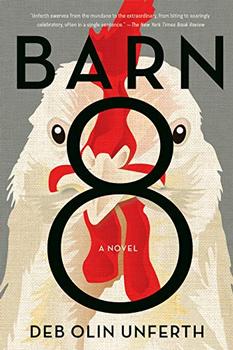Summary | Excerpt | Reviews | Beyond the Book | Readalikes | Genres & Themes | Author Bio

Excerpt
Barn 8
A nest. Built of 14-gauge galvanized wire mesh, twenty-five thousand water nipples, a moss of dander and feed. Six miles of feed trough runs down rows, up columns. Staggered tiers rise ten feet high into the shape of the letter A, the universal symbol for mountain. Wooden rafters, plywood walkways. Darkness. Sudden light. Three hundred thousand prehistoric eyes blinking. The entire apparatus ticking and whirring and clanking like a doomsday machine. Above it the purr, coo, and song of a hundred and fifty thousand birds at dawn.
1
The moment Janey stepped off the bus she suspected her error. Until then (through the long hours of the ride, pulling through town after town, the day dimming, the door sighing open and shut, the darkening, then the darkness, her head lobbing back and forth in a half sleep, stepping down to change buses in Chicago, waiting on the cement with her duffel, pulling out again into the dark, then the sunrise, the plaid day flipping by, her reflection laid against the window over the highway signs and strip malls) she'd felt she was at the start of a great journey. She'd peeled off from her former self, left the old Janey behind.
She could almost see the old Janey ghosting along her usual track, back in the city, headed to school. They were like conjoined twins torn apart: one would live, the other would die, and the doctors weren't sure which was which, so the world watched, waited. She trembled with anticipation (the states widening, the land flattening, the fields turning into fields, not tangles of brush and trees, the God signs whipping by along the roadside). She, the new Janey, had stepped out of the line of her classmates and walked away, and who knew what would happen now. She could almost glance back across the country and see the line move forward without her, the old Janey inch up, follow those in front of her like a cow.
But now, a day and a half later, she got off the bus, climbed down on gummy legs, and the station instilled her first doubt. The clean plastic seats, the antiseptic smell, the collection of very badly dressed people, their suitcases wrapped in cellophane and piled on the floor like the components of a giant packed lunch.
Mostly, her father: not there. She didn't know what her father looked like, but no man stood by the door with the expectancy and nervousness fitted to the occasion. No one shifted from foot to foot, turned a cap in his hands, glanced up at each person coming in from the bus. Or, a different version: no one waited in the middle of the room with a proprietary shine, arms folded across his chest, a batch of supermarket flowers wrapped in plastic in one hand, pointing toward the floor. No one around was the least bit interested in Janey's great journey. No one was having a great journey themselves.
She hadn't counted on him being at the station. He hadn't said he would be. He had said nothing at all, since he hadn't answered when she texted (the stupidity of a text in this circumstance) or called ("Uh, hi, this is Janey, your ... daughter"). Janey lowered her duffel bag to the gleaming floor and checked her phone (another message from her mother, which she ignored). But she had counted on him being there.
Back at the other end of the long ribbon of the bus ride, on the other side of the country, the old Janey would be walking home from the train right now, school out at four, debate till six, a canopy of trees listing overhead. Janey could almost see her passing brownstones, swinging her backpack, tripping up the steps to the apartment, calling out, "Ma, you home?"
No, wait. The old Janey was an hour ahead of this one. She'd be eating dinner, settled into a chair, squatting with one foot on the seat, her fork in the air in a gesture of "holding forth," her mother leaning against the stove, laughing. Meanwhile, the new Janey, the one who now paused in front of a line of concession machines, had lost her appetite, though she hadn't eaten much on the slow, uncomfortable bus (she now conceded the discomfort, but while in transit she had posted photos of barns, hay, houses, population signs, along with cartoon faces expressing glee, humor, surprise, revelation, and other emotions she did or did not feel), concession machines of flat sandwiches locked in plastic compartments, cigarettes released by a coil. Jesus. She lifted her duffel and walked out into the cool spring evening.
Excerpt from Barn 8. Copyright © 2020 by Deb Olin Unferth. Used with the permission of Graywolf Press, Minneapolis, Minnesota, www.graywolfpress.org.
Your guide toexceptional books
BookBrowse seeks out and recommends the best in contemporary fiction and nonfiction—books that not only engage and entertain but also deepen our understanding of ourselves and the world around us.